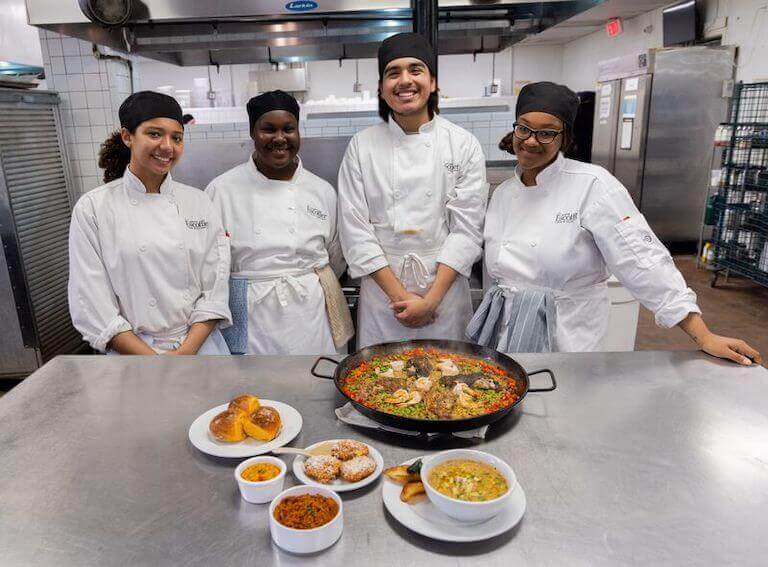Listen to This Article:
Cost should never be a barrier to pursuing your culinary dreams.
But in reality, most people don’t have the cash on hand to attend college or vocational school. That’s why it’s so important to use every resource available to close the gap between what you have and what you may need for your education!
If you’re dreaming of culinary school but you’re not sure how to pay for it, this list of financial aid resources could be just the place to start.
1. Federal Financial Aid
It’s a common misconception that culinary school students are not eligible for federal financial aid. In many cases, this is not true!
Federal financial aid in the form of grants and student loans may be available to eligible culinary school students, as long as their schools are accredited. Accreditation verifies that the school’s programs meet certain standards for rigor and quality.
Escoffier’s Austin and Boulder campuses (including online programs) are accredited at the national level. So Escoffier students who meet the federal eligibility requirements can complete the FAFSA, then apply for federal grants and student loans.
Am I Eligible for Federal Financial Aid?
The Department of Education has a number of eligibility requirements. These include (but aren’t limited to):
- Demonstrating financial need
- Being a U.S. citizen or eligible non-citizen
- Being enrolled or accepted in an eligible degree or certificate program
- Qualification to attend a college or postsecondary school (usually shown through a high school diploma or state-recognized equivalent)
- For a full list of eligibility requirements, visit studentaid.gov.
To find out how much federal financial aid a student may qualify for, they must fill out the Free Application for Federal Student Aid (FAFSA®). This is the starting point for all federal student aid!
2. Scholarships Directly From Your School**
Did you know that your culinary school may offer scholarships directly to its students? Scholarships are financial gifts for education that don’t have to be repaid. Depending on the type of scholarship, this funding could be used for tuition, books, supplies, and even living expenses.
Many schools have their own scholarship foundations that offer need-based and/or merit-based scholarships to their students. These awards can be a perfect starting point for a student’s scholarship search!
The Escoffier Scholarship Foundation, for example, offers need-based scholarships. The (ESF) has a limited number of individual student awards up to $500 that will vary in number based off each respective term start date and funds available. For residential students, (ESF) has a limited number of $1000 awards.
Culinary schools may also offer scholarships to participants and winners in a number of high school-level culinary competitions. Ranging from $500 to $7,000, these awards could be granted to students who compete in one of the following competitions:
- Family, Career and Community Leaders of America STAR Events
- National Restaurant Association ProStart® Invitational
- SkillsUSA Competitions
Each culinary school will offer its own unique scholarships, so make sure to check their programs to see what you could be eligible for!

Escoffier offers scholarships to qualifying participants of some culinary competitions.
3. Private Scholarships From Businesses & Industry Groups
Outside of your culinary school, many private groups in the culinary, baking & pastry, and hospitality industries offer scholarships to eligible students. These scholarship providers range from national industry associations and chef’s groups to smaller, local businesses.
It would be impossible to list all of the scholarships available, but you can start with the following resources! And for more possible scholarship opportunities, check out our Essential Guide to Culinary School Scholarships.
Restaurant & Industry Groups
The restaurant industry has a vested interest in promoting the cause of culinary education. They’re always hungry for trained cooks and chefs, so they’re usually happy to help support the students’ culinary aspirations. The National Restaurant Association Education Foundation is a major source of scholarship funding for culinary school and hospitality students.
And for students considering Escoffier’s Austin or Boulder campuses, consider the National Restaurant Association’s statewide chapters: the Texas Restaurant Foundation and the Colorado Restaurant Foundation.
Chef Associations
There are many chef’s groups that can offer culinary school scholarships as well. While the specific goals of these organizations vary, they’re united in their support of the culinary industry—and therefore in their support of future chefs.
The following groups offer a number of scholarships to aspiring cooks and chefs to help them achieve their culinary school goals.
- American Culinary Federation
- James Beard Foundation
- Les Dames d’Escoffier (international and local chapters)
- Research Chefs Association

Scholarships from chef associations could make it easier to get into the classroom.
Local Business & Industry Groups
Beyond the national groups, there are various restaurants and hospitality industry associations on the local and state levels that may offer scholarships to culinary school students.
Start with a simple Google search for scholarship options in your area. You may also wish to contact your local chamber of commerce for their suggestions. Also, consider the local chapters of national organizations! For example, the Austin Chapter of the Texas Chefs Association (part of the American Culinary Federation) could be a great resource for students attending Escoffier’s Austin campus.
4. Your Financial Aid Office
Who knows more about financial aid resources than your school’s office of financial aid?
Most schools have a dedicated office that is specifically there to help students navigate funding and answer their questions. These professionals may be able to walk you through completing the FAFSA®, help you understand your award package, and suggest additional resources based on your specific circumstances.
A relationship with your financial aid office can make the process of paying for school easier and less stressful!
5. Your Employer
Did you know that some restaurants and hospitality businesses may help their employees pay for culinary school? It’s a smart investment. In a world where it’s increasingly difficult to get well-trained, passionate cooks and chefs, employers have a strong incentive to build the skills of the team they already have and to build loyalty among their employees. Helping cooks pay for culinary school can promote both!
Auguste Escoffier Global Solutions offers Work & Learn, which partners with restaurants to help their employees get professional training without taking a leave of absence. Students can earn their degrees or diplomas online while they continue to work. This can allow them to bring what they’re learning right back into the kitchen with them!
Learn how Escoffier student Terrydon Williams is taking advantage of going to culinary school while working.
Plus, employees who apply and qualify may receive an Escoffier scholarship—an award that some employers may choose to match.
If this is something you’re interested in, tell your employer about it!
“When you get into this Work & Learn situation, you get to work hands-on, one-on-one with these students. I’m able to put my stamp on their careers and be able to influence them. They also get the great formal education that Escoffier provides.”*
Tim Condon, Executive Chef at The Angry Cactus and Work & Learn Partner
Financial Aid Isn’t an Exception. It’s the Rule.
If you think you may need to use financial aid to pay for culinary school, you’re not alone. The majority of Escoffier students use some form of aid to cover their programs!† With a combination of financial aid resources like loans, scholarships, and/or employer tuition assistance, more students than ever before can have access to the culinary education that they may need to help them reach their goals.
If you’re not sure where to start with creating your own financial plan, start by talking to an Escoffier financial advisor! We can help walk you through the process, explore which options are right for you, and answer your questions about how financial aid works.
To learn more about paying for culinary school, try these articles next:
- A Guide to Paying Back Student Loans
- What is the Difference Between a Subsidized and Unsubsidized Loan?
- Is Culinary School Expensive?
*Information may not reflect every student’s experience. Results and outcomes may be based on several factors, such as geographical region or previous experience.
**The funding sources listed in this article are third-party offerings and not offered by Auguste Escoffier School of Culinary Arts. Open dates, deadlines, and application criteria may change. Always check the provider’s website for updated information.
†95% of Austin students and 59% of Boulder students who entered postsecondary education for the first time received some financial assistance in 2022-23 for those who applied and qualified. College Navigator, National Center for Education Statistics.

 “When you get into this Work & Learn situation, you get to work hands-on, one-on-one with these students. I’m able to put my stamp on their careers and be able to influence them. They also get the great formal education that Escoffier provides.”*
“When you get into this Work & Learn situation, you get to work hands-on, one-on-one with these students. I’m able to put my stamp on their careers and be able to influence them. They also get the great formal education that Escoffier provides.”*